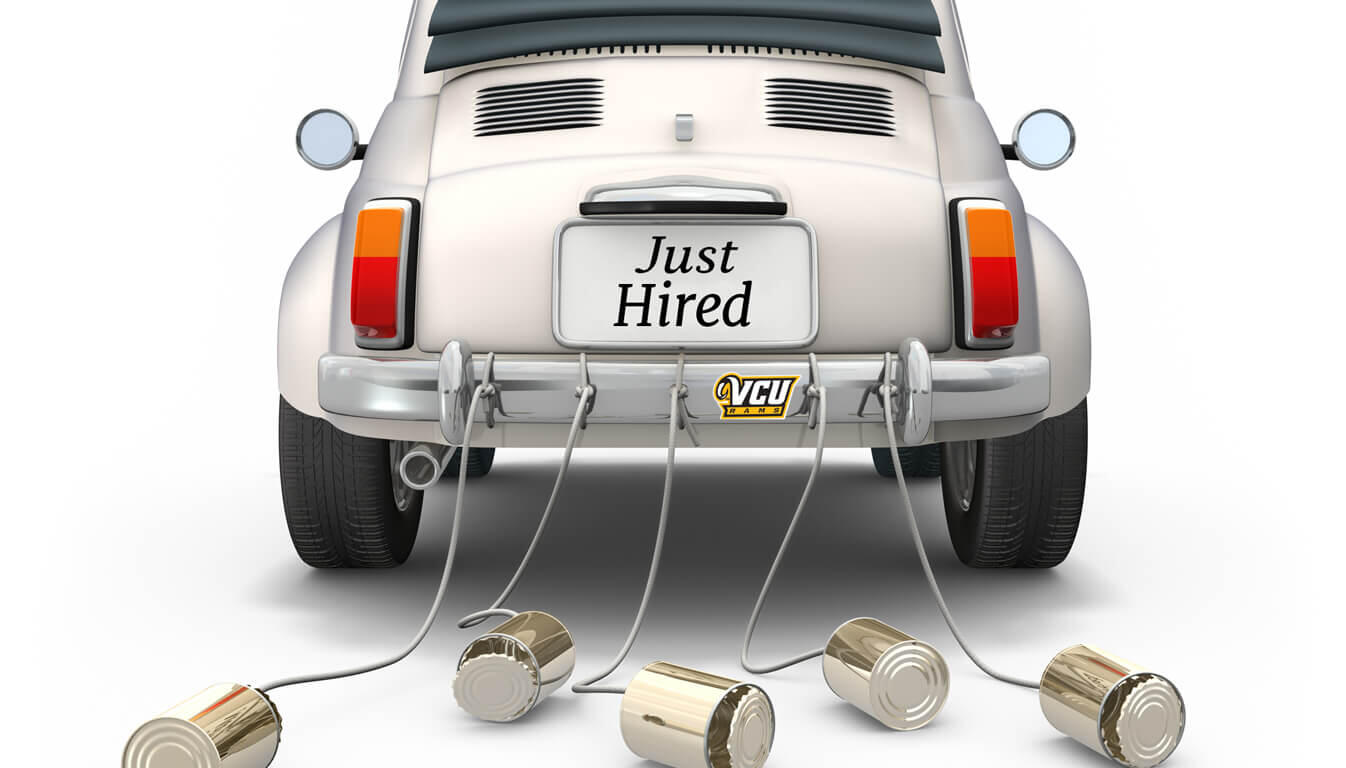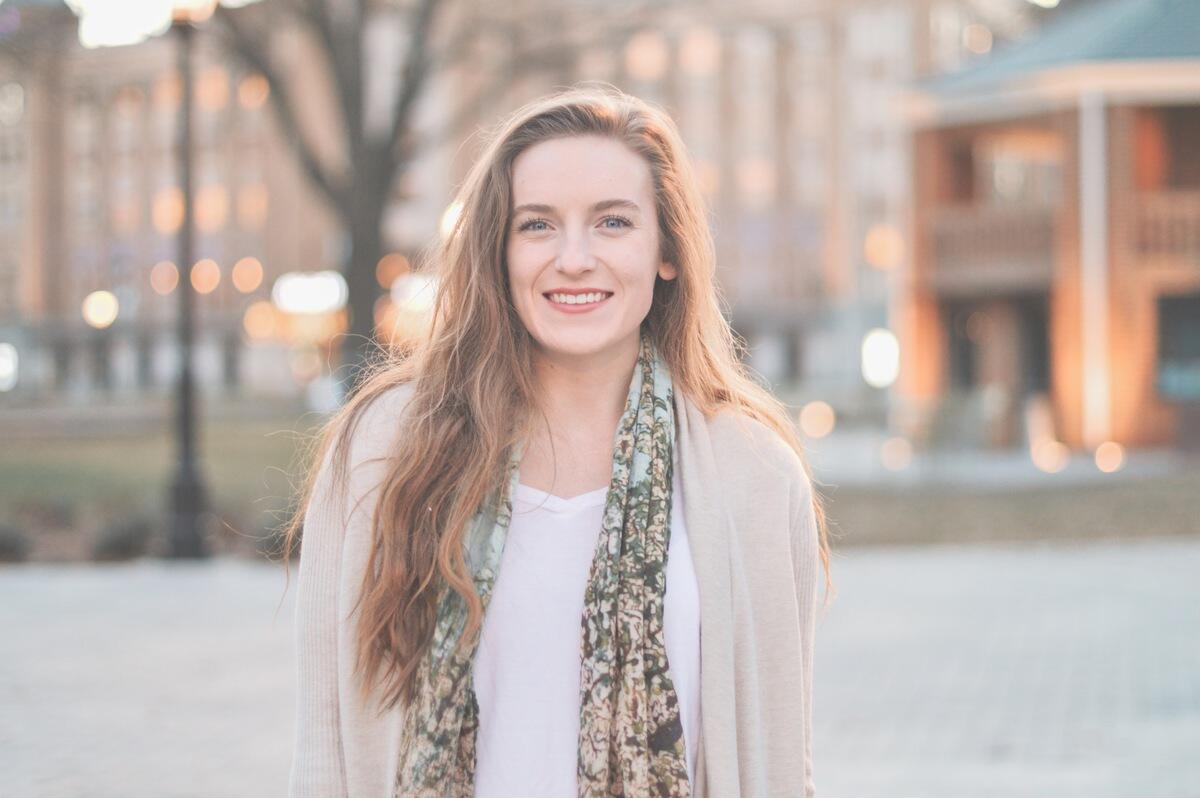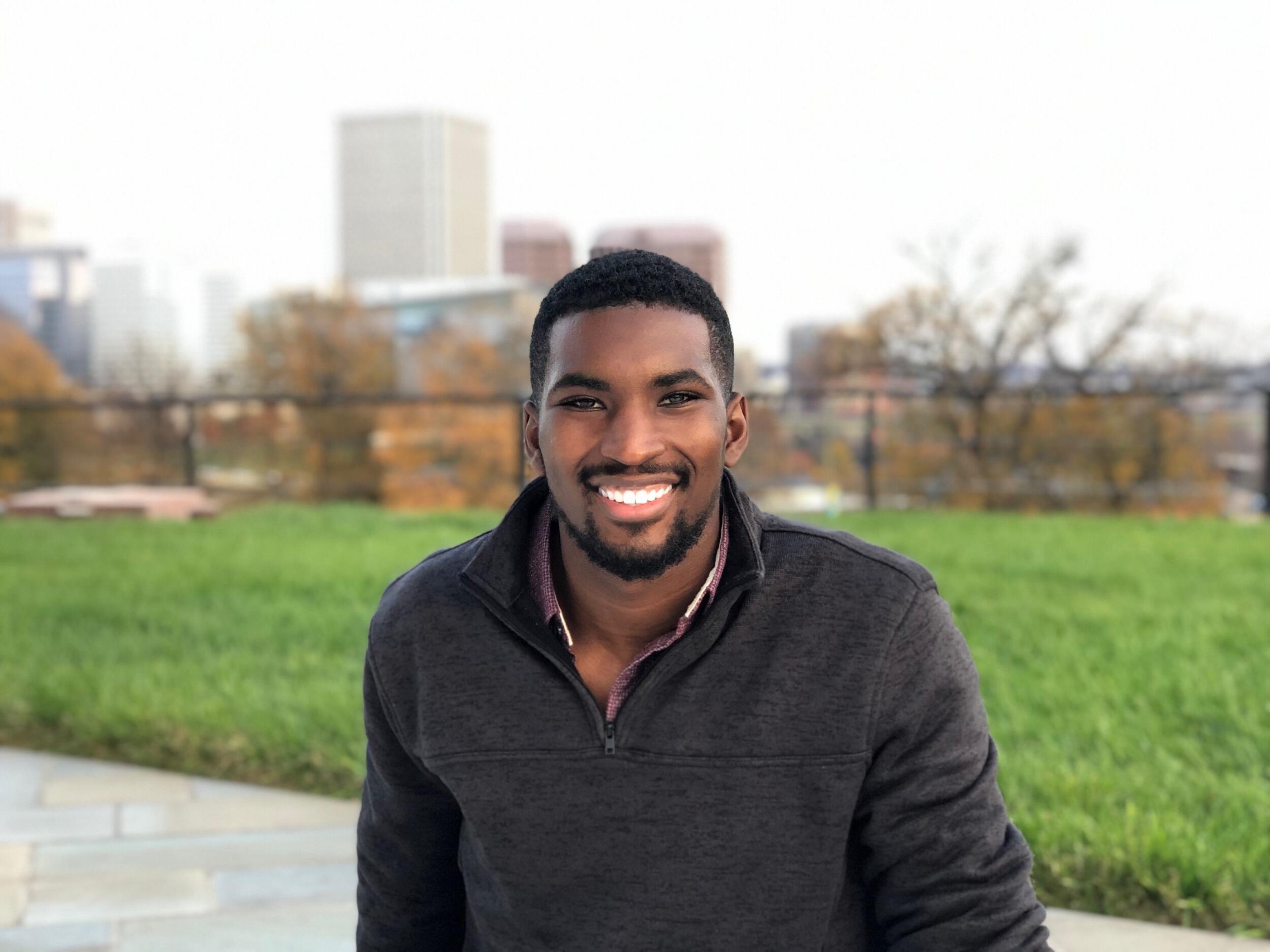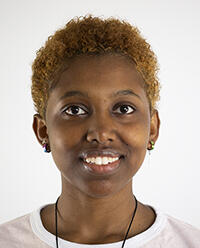
Dec. 4, 2020
Job hunting during a pandemic? It’s not easy, but recent and soon-to-be grads share how they found success.
Share this story
When today’s graduates first started taking classes, they probably didn’t picture their first job interviews after graduation taking place from their couches, perhaps with bunny slippers on their feet or a pet curled up next to them. But the COVID-19 pandemic upended the job search process, along with so many other things, and made finding a job even more daunting than usual.
That hasn’t stopped Virginia Commonwealth University students graduating during the pandemic from putting their best foot forward — bunny-slipper clad or not — and embarking on searches that ultimately landed them jobs in their chosen career fields. VCU News checked in with four recent grads, and one student set to graduate in May, to learn about their fruitful job hunts.

Kelsey Reynolds
B.S. in clinical radiation sciences
Job: CT technologist, VCU Medical Center
Reynolds loves her new job and her co-workers.
“What I am doing is amazing,” she said.
When she graduated in May with a bachelor’s degree in clinical radiation sciences with a concentration in nuclear medicine technology, she intended to find a job as a nuclear medicine tech. But that wasn’t in the cards.
“I had been job hunting and it was really tough. With everything going on in the world, jobs in nuclear medicine pretty much shut down. The job market was limited,” she said.
After two months of searching, she turned her focus to CT tech openings.
“In the nuclear medicine program we had to rotate through CT because they want us to have a background in CT as well. When I did my CT rotation, I wasn’t expecting to love it like I did. I wanted to pursue it further,” she said.
Reynolds previously held a position with VCU Health as a radiology informatics assistant, working overnights when she was in school. When she started looking for a job, she used the interpersonal relationships she cultivated at school and work.
She also worked with VCU Career Services to create her resume. “They were also helpful. They helped me with a mock interview as well,” she said.
Her education at VCU prepared her for her job, she said.
“Within nuclear medicine they allowed us to have more opportunities in the field of radiology,” she said.
Her advice to upcoming graduates: Use the resources and connections you have made in school.
“If you haven’t done so, reach out and make those connections. The more people you have for guidance that will advocate for you, the better it will be for you,” she said. “Always keep your head up because things will work out the way they are supposed to.”

Isaiah Harvin
Master of Product Innovation
Job: business analyst, product management, HBO Max
Harvin was happy working as an assistant brand manager at Altria when he was contacted by a recruiter with HBO just as he was about to graduate with a master’s degree from the da Vinci Center in August 2020. He had already earned a bachelor’s degree at VCU in marketing in 2018.
“I was just sourced out of the blue because of my social presence on LinkedIn and the work I was doing outside of my job at Altria or the work outside of school,” said Harvin, who was a co-organizer of the Richmond-based industry meetup ProductTank and helped co-found a European-based computer software startup, APTIC, which uses computer vision technology to deliver navigation and autonomy to the visually impaired.
“It was really surreal. It felt like a dream come true to think that somebody saw something in me, and took a chance to see what I can bring to the table.”
His new position as a business analyst in product management at HBO Max helps shape the stories that are told. “On the multicultural marketing committee, I’m able to see stories and shows as they’re being put together and provide perspective on authenticity of characters and scripts to help shape what people see on the outside.”
He credits his da Vinci Center experience with giving him an understanding of how to build businesses and preparing him to take on a lot of responsibility right out of school, as well as helping him better understand his value and how to position himself in his career. He also was able to practice interviewing through mentorships while in school.
His research in grad school focused on the study of signs and symbols related to product design in dollar stores. Now research plays a part in his current position.
“I’ve reported a lot on the metrics of the business. I also helped to shape the ways that we learn about the products, measuring our success,” said Harvin.
Matthew Toscano
B.A. in African American Studies and B.I.S.
Internship: Museum Leaders in Training, Virginia Museum of Fine Arts
As he prepared to graduate from VCU in May, Toscano was planning to intern at art museums in Washington and gain experience in pursuit of his dream to one day work as a curator with a focus on African art. However, when the pandemic hit, those opportunities evaporated.
His plans upended, Toscano submitted an application to intern locally at the Virginia Museum of Fine Arts, even though it was past the typical time to apply.
“I emailed them and asked if they were still taking anybody, but it was pretty late in the game,” said Toscano, an Honors College graduate who received a B.A. in African American Studies from the College of Humanities and Sciences and bachelor of interdisciplinary studies with a focus on intercontinental art and film history from University College. “They told me to go ahead and apply anyway.”
One of Toscano’s favorite professors at VCU was Trent Nicholas, who teaches film history in the School of the Arts and is coordinator of statewide media resources at the VMFA. Nicholas saw Toscano’s application and helped him get hired for an internship in the museum’s education department, specifically with a program called M.LiT: Museum Leaders in Training, in which teenagers explore museum careers and gain leadership and career skills.
Not only does Toscano feel lucky to have landed a great internship in his field, the experience has also made him realize that he has a love for teaching.
“I’m really just enjoying being at a museum in any way right now, but it’s been just a great experience too,” he said. “Prior to the internship, I thought I was, for sure, going to pursue a curatorial position in museums, but now I'm definitely also thinking about teaching.”
Looking beyond his VMFA internship, which wraps up in January, Toscano is applying to graduate school, with an eye toward Ph.D. programs in art history.
When asked if he has any advice for other VCU students graduating amid COVID-19, Toscano suggested applying for the job or internship even if you think they aren’t accepting applications.
“When I applied, it was way past when people would normally be applying for internships. I just emailed and said, Would it be OK? And they said, Sure, go ahead. So I would say go ahead and apply. Especially during COVID, everything’s up in the air and the old rules don’t necessarily apply.”
Get the jobVCU Career Services’ Samara Reynolds and Haley Sims provide tips for an effective job search during COVID-19. 1. Just get started. Like searching during any other time, you have to start somewhere. Depending on your goal, this may mean compiling a short list of places you might like to apply to (and then expanding) or people you want to connect with (and then reaching out). Make an appointment with a career adviser (VCU Career Services, School of Business Career Services, or College of Engineering Career Services, depending on your major/degree), and determine which documents you’ll need to gather and update. Be brave enough to start the process, and you may be surprised at how much progress you can make in short order. 2. Add people to your team. Networking is an important component of any search and approaching this step creatively is even more critical during this time of physical distancing. People want to help, but you need to let them know what you need. Reach out to friends and family so they can keep an eye out for opportunities. Reconnect with potential references. VCU Link and VCU’s LinkedIn can help you tap into the VCU alumni network. Check out the informational interview guide to learn more about reaching out to folks in your industry. 3. Track your activity. Once you begin applying, it can be difficult to remember dates and details. Keep a list or chart of where you have submitted materials, along with related deadlines, and plan to follow up. Also, make sure you keep a copy of the job description in case the online posting is removed. Schedule regular check-ins with yourself to measure progress and reflect on what else you can do to drive your job search forward. You should be the most active participant in your search process, and following up can make a real difference in whether and how decision makers see your materials. |
Eden Zewdu
B.S. in biology
Job: research associate, OriGene Technologies
After graduating with a bachelor’s in biology in May, Zewdu wanted to do research but it took her a while to find the right opportunity. She was only recently hired at OriGene Technologies.
“You need to be really patient, because it is really easy to get discouraged,” she said.

Zewdu had not originally planned to work in the private sector. Before graduation, she was looking for a post-baccalaureate research opportunity, possibly with the National Institutes of Health. She wanted to focus purely on research in an academic setting. While at VCU, Zewdu did research in a lab and participated in a National Institutes of Health program designed to increase professional growth within the sciences. But Zewdu soon realized that her dream of a post-baccalaureate program was not going to happen.
“Due to a lot of cutback from the pandemic, that didn’t work out,” she said.
In August, Zewdu changed course. She worked with advisers at Career Services to create a resume that compiled all of her worthy experiences. She said the experience really helped her put together a professional-looking resume.
Zewdu applied at numerous places and got some responses, but said it was challenging at times to keep moving forward.
“I got just enough response to keep me going,” Zewdu said.
She started work in October and believes her training at VCU really prepared her to work at a biotechnology company.
“A lot of application and critical thinking is involved in my job, and I believe my research experience and classes at VCU helped me,” she said.
Though it’s not her dream job, Zewdu said she feels she is gaining valuable experience. She wants to apply to graduate school in two years.
“You should try to find something that you can grow with,” Zewdu said. “I didn’t get something that was exactly what I was looking for but it will get me a step closer to what I want.”

Maria Balladares
Class of 2021, B.S. in business
Job: Human resources rotational program associate, Capital One
Balladares thinks her nontraditional path in higher education successfully positioned her for the human resources rotational program associate job she will begin at Capital One next summer after she graduates with a bachelor’s degree in business in May.
After high school, Balladares worked for several years at T-Mobile before starting college. Despite a resume that showed those years of experience and an internship at the Virginia Department of Corrections that turned into a part-time position in employee relations, job hunting during the pandemic was stressful.
“In March, April and even in May, I started getting so many emails from internships that I had applied to that they were all canceling. So it was really discouraging,” Balladares said. “I’d also seen the news of the people going on unemployment. That was also scary because even before COVID, the market was already so competitive.”
Staff at School of Business Career Services helped her with interviewing skills, especially those tell-me-about-a-time type of questions.
“They were really good at calming me down and helping me become more confident in my interviewing skills,” Balladares said.
Her upcoming position at Capital One is part of a two-year program specifically designed to train recent graduates to become leaders in human resources.
“I’m really interested in employee relations because I’m interested in labor movements and worker rights — everything that has to do with work,” Balladares said.
Elinor Frisa, Brian McNeill, James Shea, Joan Tupponce and Dina Weinstein from University Public Affairs contributed to this story.
Subscribe to VCU News
Subscribe to VCU News at newsletter.vcu.edu and receive a selection of stories, videos, photos, news clips and event listings in your inbox.










